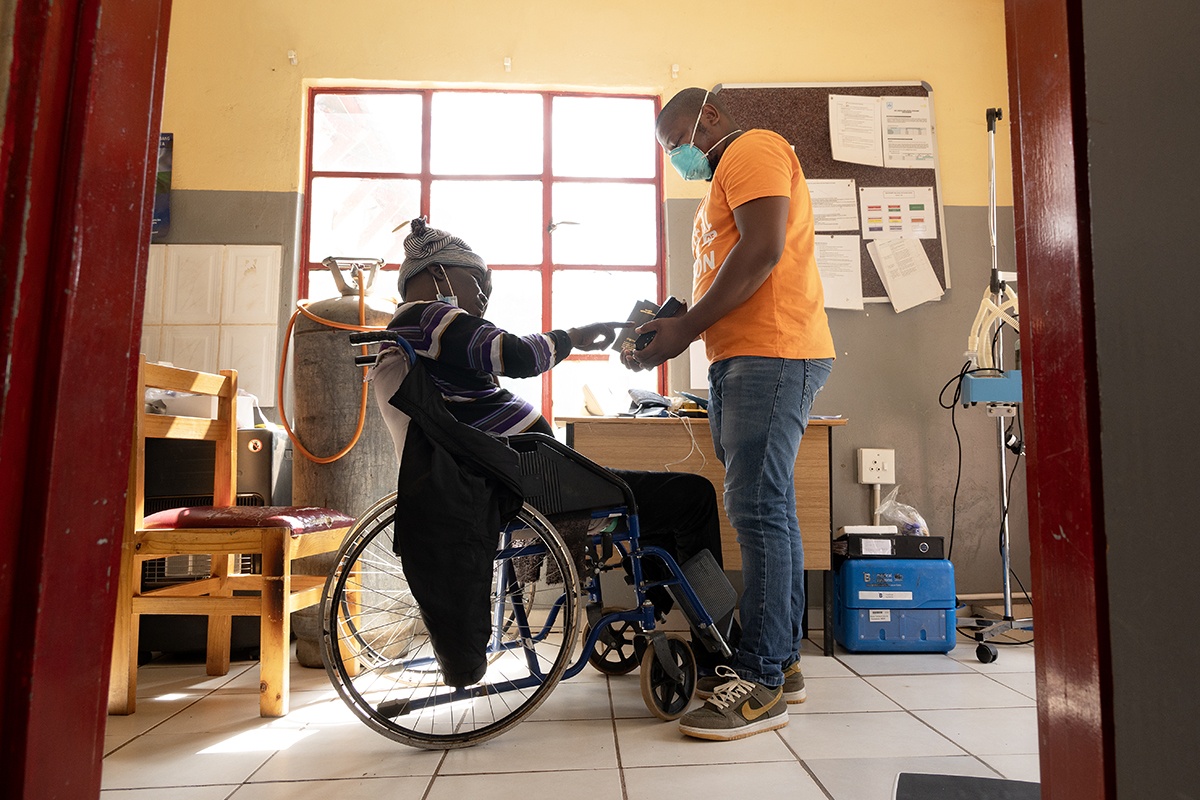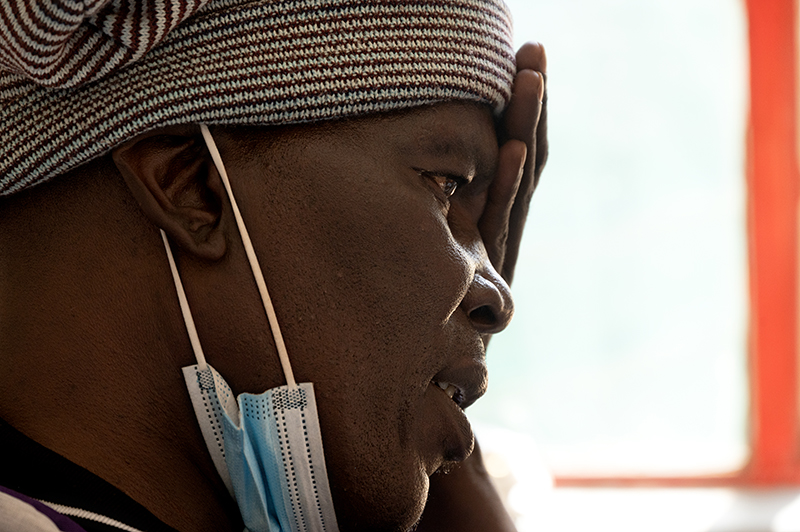Treating Mental Health and Tuberculosis in Rural Lesotho
Since 2017, PIH Lesotho has screened thousands of patients with TB for depression, anxiety, and other mental health conditions
Posted on May 31, 2024

In the picturesque but rugged Maloti Mountains of Lesotho, Nkau Health Center stands as a beacon of hope for many suffering from tuberculosis (TB). The rural facility, located several hours from the capital city Maseru, provides comprehensive care for hundreds of patients living in the region, such as 49-year-old Qacha Qabane.
In 2022, Qabane was diagnosed with multidrug-resistant tuberculosis (MDR-TB) at Partners In Health (PIH)-supported Nkau Health Center and immediately began treatment, which includes medication and social support, such as food and transportation. Months later, his chest and back began to hurt. He was soon diagnosed with Pott’s disease, which is when TB impacts the spine and causes severe discomfort.
Now paralyzed from the waist down and confined to a wheelchair, he is no longer able to farm, which he previously did to support his wife and two children. Like many with MDR-TB, Qabane faces daily physical and mental health challenges due to the common infectious disease.
An integrated approach
Recognizing the profound impact that TB has on mental health, PIH Lesotho integrated mental health care into its MDR-TB treatment program in 2017 by beginning to screen all patients for depression and anxiety. Initially piloted at Nkau Health Center, the initiative expanded to PIH-supported Botšabelo Hospital in Maseru and various rural and community clinics nationwide. In 2024, substance use disorder screening was added.

Beyond screening, the team diagnoses, manages, and provides psychosocial support for patients diagnosed with mental health conditions. This approach improves adherence to treatment, treatment outcomes, and the overall quality of life for patients with MDR-TB, says Mpiti Nkuebe, PIH Lesotho’s mental health program manager. While mental illness does not discriminate, those with TB—who are often stigmatized—are especially vulnerable.
"Depression and anxiety are more prevalent among people with tuberculosis than among the general population. It’s estimated that over 40% of people with TB have depression," says Nkuebe.
That includes Qabane, who was referred to Botšabelo Hospital for initial appointments, before receiving ongoing care at Nkau Health Center.
“Mr. Qabane was assessed for mental health when he was first admitted to [Botšabelo Hospital] as he showed signs of depression. After evaluating and confirming that he had depression due to MDR-TB, our mental health team conducted weekly assessments for his stay. He has been on depression medication since then,” says Dr. Stephanie Mpinda, a clinician involved in Qabane’s care.
For Qabane, the impact of MDR-TB has been devastating. Now living with his sister, he relies heavily on the support of his wife, niece, and PIH Lesotho.
“MDR-TB has taken away my right as a man to provide for my family and robbed them of a normal life,” says Qabane. “The physical pain is constant, but the mental toll is even harder. I feel like a prisoner in my own body. I used to be so full of life, and now I can't even stand up. It's incredibly depressing. Some days, it feels like there's no hope.”
Mpinda emphasizes that Qabane is on medication, and that with time, there is hope for his recovery.

Ongoing training, improvements
From April 2023 through March 2024, PIH Lesotho screened more than 1,000 patients with MDR-TB for depression and anxiety across its seven Rural Health Initiative sites. Screenings continue to increase, and the overall mental health program continues to improve and expand—across all 11 PIH sites around the world.
Recently, PIH Lesotho’s MDR-TB clinicians received extensive training in psychological first aid, equipping them with essential skills in mental health care and safety assessment, including suicide risk assessment. This training ensures that clinicians are well-prepared to manage the psychological impacts of MDR-TB on patients.
Additionally, the mental health team continues to improve their mental health resources by tailoring them to patients. For example, a mental health brochure was recently developed in Sesotho, one of Lesotho’s official languages. The document is used to educate and inform patients and their treatment supporters about mental well-being, mental illnesses, and the care options available to them. Treatment supporters are individuals, oftentimes a patient’s neighbor or friend, who visit the patient at least twice daily to help them take their medication, answer questions, and more.
Every month, treatment supporters conduct monthly mental health check-ins with their patients using a standardized checklist. These regular check-ins are vital in monitoring the mental health of patients with MDR-TB and ensuring timely intervention when needed. This comprehensive strategy not only enhances the quality of care for patients with MDR-TB but also improves their overall health and quality of life, reflecting PIH’s dedication to holistic patient care.

